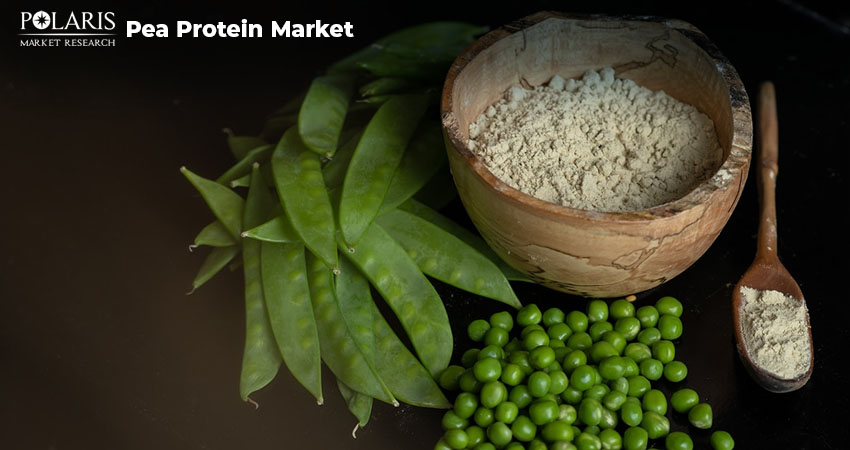How Pea Protein is Fueling the Plant-Based Protein Revolution?

Have you noticed how the food aisle is becoming greener and healthier? Pea protein, derived from the humble green pea, is making waves in the food and wellness industry. This is largely due to the growing emphasis on health, sustainability, and alternative proteins. As vegan and semi-vegan lifestyles continue to gain traction, the demand for pea protein is anticipated to experience explosive growth.
Whether you’re a health enthusiast, a sustainability advocate, or just curious, this blog dives into the world of pea protein, exploring its market trends, top companies driving the innovation, and what the future holds. Stick with us!
How Is Pea Protein Made?
Pea protein powder is one of the famous dietary supplements that is created by separating the protein from ground yellow peas. Pea protein is an excellent source of iron and a high-quality protein. It can help with weight loss, heart health, and muscle growth. Since pea protein powder is naturally vegan and hypoallergenic, it can be used to boost the protein content of smoothies and shakes and is suitable for nearly any diet.
Who Makes Pea Protein?
- Roquette Frères
Overview: Founded in 1933 and headquartered in Lestrem, France, Roquette is a global leader in plant-based ingredients famously known for its NUTRALYS pea protein range.
Key Strengths: The company focuses on high-performance pea protein for applications in nutrition, sports, and vegan products.
- Ingredion Inc.
Overview: Headquartered in Westchester, Illinois, USA, Ingredion provides plant-based solutions for food manufacturers, with an emphasis on clean-label and sustainable products. It is known globally for its products such as Starches, Pea Protein, Stevia, and non-GMO sweeteners. It was founded in 1906.
Key Strengths: Its VITESSENCE range offers excellent solubility and taste, ideal for beverages and snacks.
- PURIS Proteins
Overview: Founded in 1985 in Oskaloosa, Iowa, USA, PURIS is a pioneer in pea protein production, offering non-GMO, sustainable solutions for plant-based diets such as whole pulse powders, pea starch, and organic and non-GMO seeds, grains, and feed. The headquarters of this company lies in Minneapolis, Minnesota, USA.
Key Strengths: PURIS prides itself on being fully traceable and maintaining high-quality, allergen-friendly products.
- Cargill, Inc.
Overview: With its headquarters being present in Wyzata, Minnesota, USA Cargill Inc. is known for being a powerhouse in the food industry. It was founded in 1865. Cargill integrates pea protein into its extensive plant-based product lineup.
Key Strengths: Focuses on innovation to create better-tasting and highly functional plant-based foods.
- Burcon NutraScience Corporation
Overview: Burcon NutraScience Corporation is known for being Specialized in developing plant-based protein for beverages and food technologies. It was founded in 1998 and had its headquarters based in Vancouver, Canada.
Key Strengths: Known for its Peazazz® pea protein, which has superior solubility and flavor.
Recent Developments
- In April 2024, Roquette Beauté introduced its newest cosmetic ingredient, Beauté ® ST 730 INCI Hydroxypropyl Starch. The company that pea starch, a sustainable crop with very little effect on water resources, is the source of the product.
- In February 2024, Roquette announced its expansion into the market for plant proteins by introducing four multipurpose pea proteins that improve the texture, flavor, and creativeness of high-protein nutritional products and plant-based diets.
Market Evolution and Opportunities
Plant-Based Revolution
With a rising demand for vegan and vegetarian diets, the popularity of plant-based foods has increased significantly on a global scale, and new products such as pizza, lattes, vegan nutraceuticals, vegan burgers, plant-based meat, bakery goods, and pastries have been introduced. Out of all of them, pea protein has emerged as a key ingredient in plant-based foods, offering high-quality protein without allergens like soy or gluten.
Health and Wellness Boom
Consumers are prioritizing functional foods that support fitness and overall well-being. Being rich in iron and high-quality protein, pea protein is known to support heart health, help with weight loss, and encourage muscle growth. Research shows that pea protein, especially yellow pea protein, can help reduce blood pressure and cholesterol without taxing the kidneys. Thus, pea protein, rich in amino acids, fits perfectly into this trend.
Environmental Sustainability
Compared to animal-based proteins, pea protein has a significantly lower environmental footprint, appealing to eco-conscious consumers, and by leveraging the power of yellow split peas and other plant-based proteins, food manufacturers are entering into the growing market for plant-based and vegetarian products that cater to consumers who seek healthier and more sustainable dietary options.
Innovation in Food Products
From plant-based burgers to protein powders, plant-based meat, vegan supplements, bakery goods and pastries, vegan pizzas, additions to smoothies, coffees, and dairy alternatives, manufacturers are leveraging pea protein in various innovative food and beverage applications.
Government and Corporate Investments
Governments and companies are pouring resources into research and development to improve the taste, texture, and functionality of pea protein products. Also, pea protein producers have a lot of opportunities as a result of government programs supporting sustainable farming methods and pea cultivation as a crop high in protein.
What Does the Future Holds?
Expansion of Product Portfolios: As the market matures, companies are anticipated to diversify applications, including functional foods, beverages, and even pharmaceuticals.
Flavor Innovations: In order to improve consumer appeal, ongoing research and development are being done to address persistent problems with the taste and texture of pea protein.
Increased Sustainability Initiatives: With rising awareness, companies are implementing sustainable farming and sourcing practices alongside eco-friendly production and processing methods to align with eco-conscious trends.
Conclusion
The pea protein market is a prime example of how innovation, sustainability, and health can coexist harmoniously. With established players like Roquette and up-and-coming firms like Ripple Foods spearheading the conversation, this sector is set for explosive expansion. Pea protein is subconsciously changing our food systems, whether you're enjoying a plant-based burger or drinking dairy-free milk. We can anticipate even more cutting-edge uses and developments in the pea protein market as research and development pick up speed.

